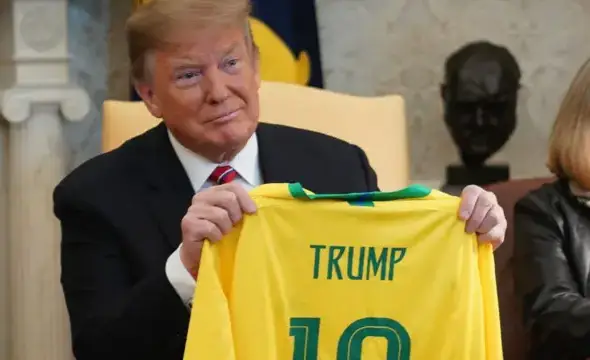The U.S. Supreme Court recently announced that it will decide if Trump can pursue his aggressive tariff agenda. This responds to an earlier decision by a federal appeals court declaring that significant parts of the Trump tariffs are illegal. The appeals court ruled that the International Emergency Economic Powers Act (IEEPA) did not authorize President Trump to impose many of the controversial tariffs announced this year. IEEPA has been the primary tool in Trump’s trade war, allowing him to bypass input from government agencies and Congress.
Brasil, se liga. Since August 6, the United States has been using IEEPA to impose tariffs of fifty percent on imports from Brazil. Motivated largely by dissatisfaction with Brazil’s domestic politics—particularly the prosecution of former President Jair Bolsonaro—the U.S. government has pursued these measures. Only Brazil and India face such extreme rates.
What does this court activity mean for Brazil? The decision by the appeals court suggests that the duties on Brazil are illegal. If the Supreme Court agrees with this ruling, it will severely undercut Trump’s ability to use IEEPA, a hallmark of his economic policy. If so, Trump tariffs on Brazil would be illegal.
U.S. Treasury Secretary Scott Bessent has warned of a potential “diplomatic embarrassment.” Meanwhile, Trump and his legal team predict “financial ruin” if IEEPA tariffs are rescinded.
What should Brazil do?
Two steps are key: continue applying pressure to repeal the tariffs and identify the likely timeframe for any policy changes in Washington.
Pressure is already underway. On August 29, the Câmara de Comércio Exterior (CAMEX) has begun the process of evaluating whether Brazil will impose retaliatory duties. Last month, the United States agreed to consultations with Brazil under the World Trade Organization. These talks show Brazil is open to negotiation, but if they fail, Brazil retains credible options for economic persuasion.
By maintaining tariffs, Trump contradicts his campaign promise to “lower food prices.” The duties already affect major Brazilian exports such as coffee and beef, raising the cost of staples like American breakfasts and hamburgers. For this reason, Brazilian diplomats should emphasize that U.S. consumers—not foreign exporters—ultimately bear these costs. Trump and the Republican Party are unlikely to welcome chants of: “We want cheap burgers again!”
The impact of the court ruling
The recent decision concerns two sets of tariffs. The first are the Reciprocal Tariffs, announced in April and applied to dozens of countries, ranging from fifteen to forty-one percent. The ruling also covers duties on imports from China, Mexico, and Canada, which were justified as measures to curb fentanyl trafficking and illegal migration.
The Court of Appeals ruled that under IEEPA, the president can “undertake a number of actions” in emergencies, but imposing tariffs is not one of them. The statute makes no reference to “tariffs” or related terms such as “tax” or “duty.”
Applying this reasoning, other courts could conclude that the fifty percent tariffs on Brazilian imports are also unlawful. In fact, a U.S. orange juice importer has already filed such a lawsuit.
On September 9th, the U.S. Supreme Court scheduled hearings on the IEEPA tariffs for the first week in November. Before this, there will be multiple legal filings until the hearings. After that, we wait for the nine justices of the Supreme Court to decide. They will likely announce a decision in June of 2026. In most cases, they wait until the end of their annual term to issue significant rulings. Impacting the President’s signature economic policy and with global reverberations, an IEEPA ruling will be monumental.
Where does this leave Brazil?
The legal basis for US tariffs of fifty percent is in legal doubt, but no definitive action is likely for nine months. This period gives Brazil time to assess the actual economic impacts of the tariffs and prepare appropriate responses. Itamaraty should pursue negotiations while also planning retaliatory measures, if necessary. With a clear timeframe, Brazilian leaders can begin balancing domestic political priorities against the economic consequences of the current U.S. policy.













